Organisational Behaviour Report: Culture, Motivation and Teamwork
VerifiedAdded on 2020/10/22
|16
|4988
|176
Report
AI Summary
This report delves into the intricacies of organisational behaviour within the context of A David & Co Limited, a food and beverage wholesaler. It examines the impact of culture, power, and politics on individual and team behaviour, highlighting the importance of a healthy working environment. The report applies Handy's cultural typology, exploring power, task, role, and person cultures. It further analyzes content and process theories of motivation, including Maslow's hierarchy of needs, Alderfer's ERG theory, and Vroom's expectancy theory, emphasizing their role in achieving organisational goals. Additionally, the report discusses the characteristics of effective teams and the application of organisational behaviour concepts to a business situation, providing insights into improving team performance and overall organisational effectiveness.
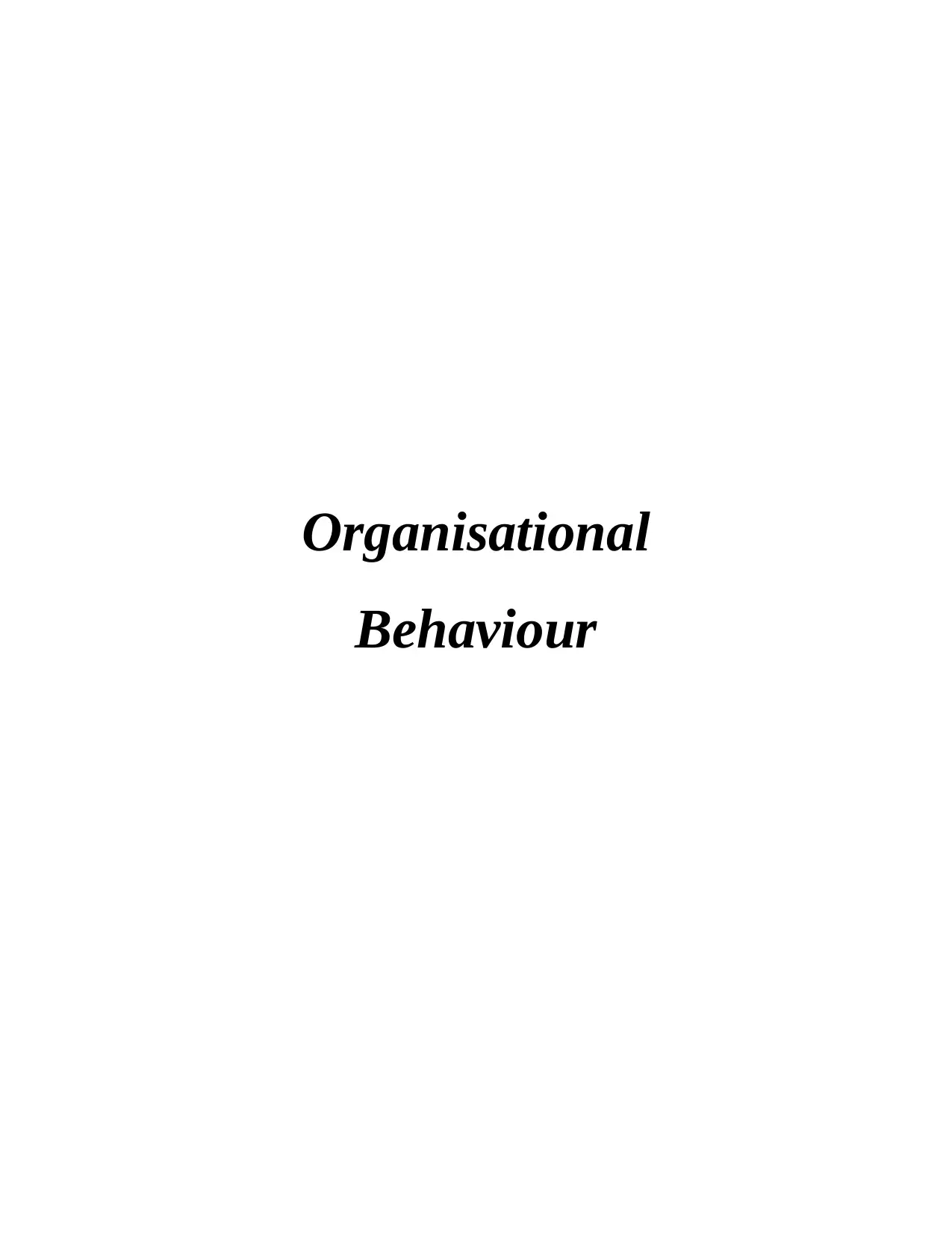
Organisational
Behaviour
Behaviour
Paraphrase This Document
Need a fresh take? Get an instant paraphrase of this document with our AI Paraphraser
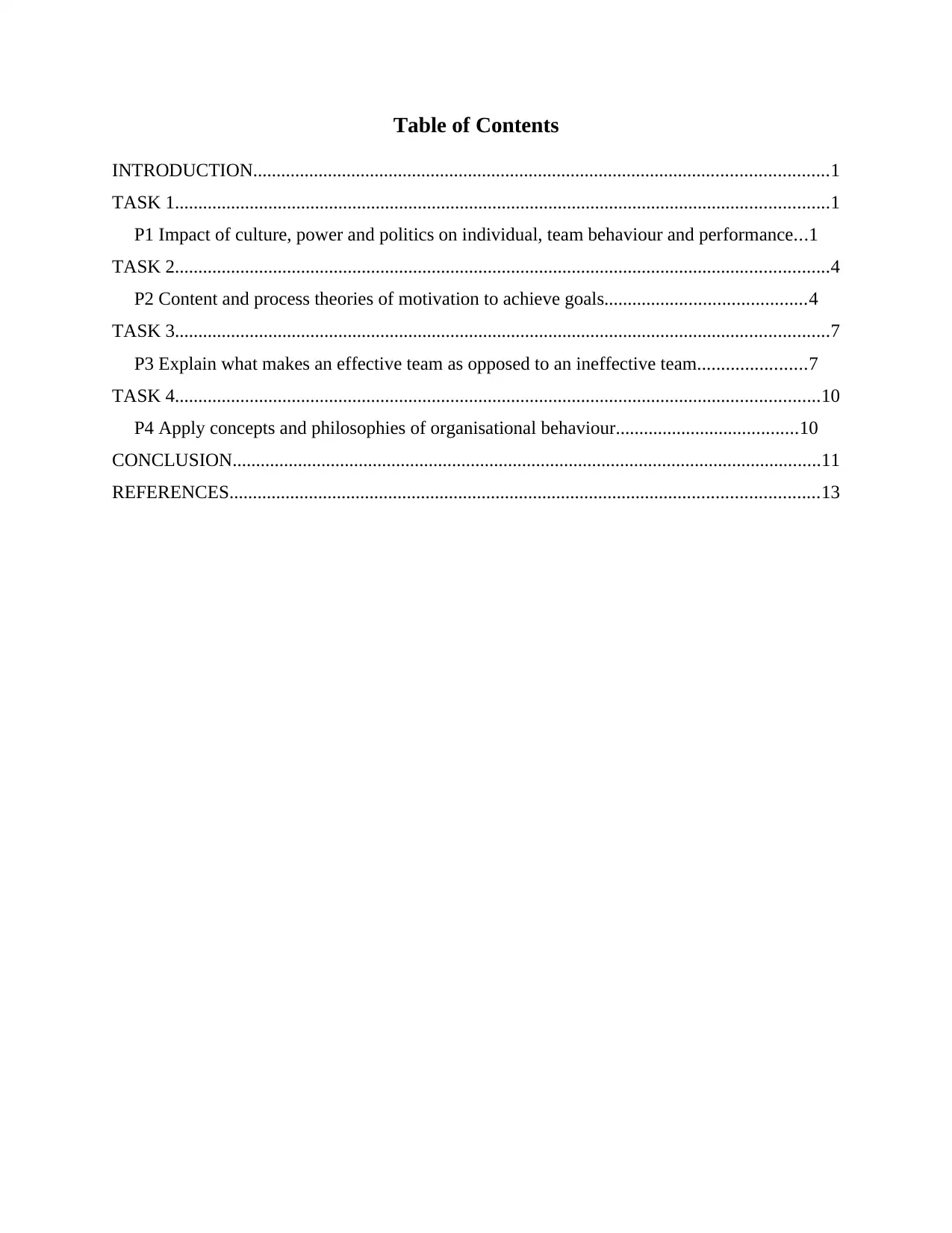
Table of Contents
INTRODUCTION...........................................................................................................................1
TASK 1............................................................................................................................................1
P1 Impact of culture, power and politics on individual, team behaviour and performance...1
TASK 2............................................................................................................................................4
P2 Content and process theories of motivation to achieve goals...........................................4
TASK 3............................................................................................................................................7
P3 Explain what makes an effective team as opposed to an ineffective team.......................7
TASK 4..........................................................................................................................................10
P4 Apply concepts and philosophies of organisational behaviour.......................................10
CONCLUSION..............................................................................................................................11
REFERENCES..............................................................................................................................13
INTRODUCTION...........................................................................................................................1
TASK 1............................................................................................................................................1
P1 Impact of culture, power and politics on individual, team behaviour and performance...1
TASK 2............................................................................................................................................4
P2 Content and process theories of motivation to achieve goals...........................................4
TASK 3............................................................................................................................................7
P3 Explain what makes an effective team as opposed to an ineffective team.......................7
TASK 4..........................................................................................................................................10
P4 Apply concepts and philosophies of organisational behaviour.......................................10
CONCLUSION..............................................................................................................................11
REFERENCES..............................................................................................................................13
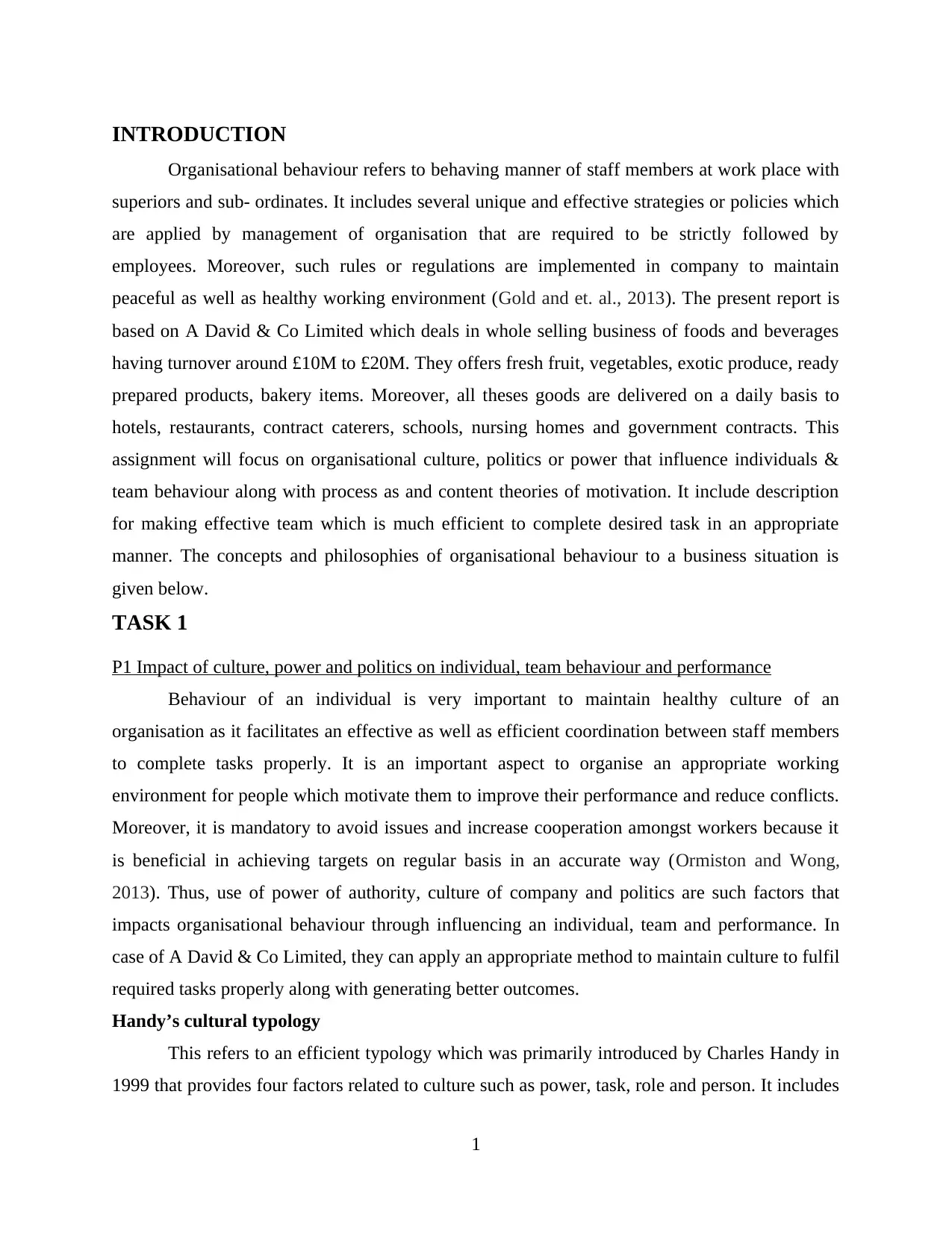
INTRODUCTION
Organisational behaviour refers to behaving manner of staff members at work place with
superiors and sub- ordinates. It includes several unique and effective strategies or policies which
are applied by management of organisation that are required to be strictly followed by
employees. Moreover, such rules or regulations are implemented in company to maintain
peaceful as well as healthy working environment (Gold and et. al., 2013). The present report is
based on A David & Co Limited which deals in whole selling business of foods and beverages
having turnover around £10M to £20M. They offers fresh fruit, vegetables, exotic produce, ready
prepared products, bakery items. Moreover, all theses goods are delivered on a daily basis to
hotels, restaurants, contract caterers, schools, nursing homes and government contracts. This
assignment will focus on organisational culture, politics or power that influence individuals &
team behaviour along with process as and content theories of motivation. It include description
for making effective team which is much efficient to complete desired task in an appropriate
manner. The concepts and philosophies of organisational behaviour to a business situation is
given below.
TASK 1
P1 Impact of culture, power and politics on individual, team behaviour and performance
Behaviour of an individual is very important to maintain healthy culture of an
organisation as it facilitates an effective as well as efficient coordination between staff members
to complete tasks properly. It is an important aspect to organise an appropriate working
environment for people which motivate them to improve their performance and reduce conflicts.
Moreover, it is mandatory to avoid issues and increase cooperation amongst workers because it
is beneficial in achieving targets on regular basis in an accurate way (Ormiston and Wong,
2013). Thus, use of power of authority, culture of company and politics are such factors that
impacts organisational behaviour through influencing an individual, team and performance. In
case of A David & Co Limited, they can apply an appropriate method to maintain culture to fulfil
required tasks properly along with generating better outcomes.
Handy’s cultural typology
This refers to an efficient typology which was primarily introduced by Charles Handy in
1999 that provides four factors related to culture such as power, task, role and person. It includes
1
Organisational behaviour refers to behaving manner of staff members at work place with
superiors and sub- ordinates. It includes several unique and effective strategies or policies which
are applied by management of organisation that are required to be strictly followed by
employees. Moreover, such rules or regulations are implemented in company to maintain
peaceful as well as healthy working environment (Gold and et. al., 2013). The present report is
based on A David & Co Limited which deals in whole selling business of foods and beverages
having turnover around £10M to £20M. They offers fresh fruit, vegetables, exotic produce, ready
prepared products, bakery items. Moreover, all theses goods are delivered on a daily basis to
hotels, restaurants, contract caterers, schools, nursing homes and government contracts. This
assignment will focus on organisational culture, politics or power that influence individuals &
team behaviour along with process as and content theories of motivation. It include description
for making effective team which is much efficient to complete desired task in an appropriate
manner. The concepts and philosophies of organisational behaviour to a business situation is
given below.
TASK 1
P1 Impact of culture, power and politics on individual, team behaviour and performance
Behaviour of an individual is very important to maintain healthy culture of an
organisation as it facilitates an effective as well as efficient coordination between staff members
to complete tasks properly. It is an important aspect to organise an appropriate working
environment for people which motivate them to improve their performance and reduce conflicts.
Moreover, it is mandatory to avoid issues and increase cooperation amongst workers because it
is beneficial in achieving targets on regular basis in an accurate way (Ormiston and Wong,
2013). Thus, use of power of authority, culture of company and politics are such factors that
impacts organisational behaviour through influencing an individual, team and performance. In
case of A David & Co Limited, they can apply an appropriate method to maintain culture to fulfil
required tasks properly along with generating better outcomes.
Handy’s cultural typology
This refers to an efficient typology which was primarily introduced by Charles Handy in
1999 that provides four factors related to culture such as power, task, role and person. It includes
1
⊘ This is a preview!⊘
Do you want full access?
Subscribe today to unlock all pages.

Trusted by 1+ million students worldwide
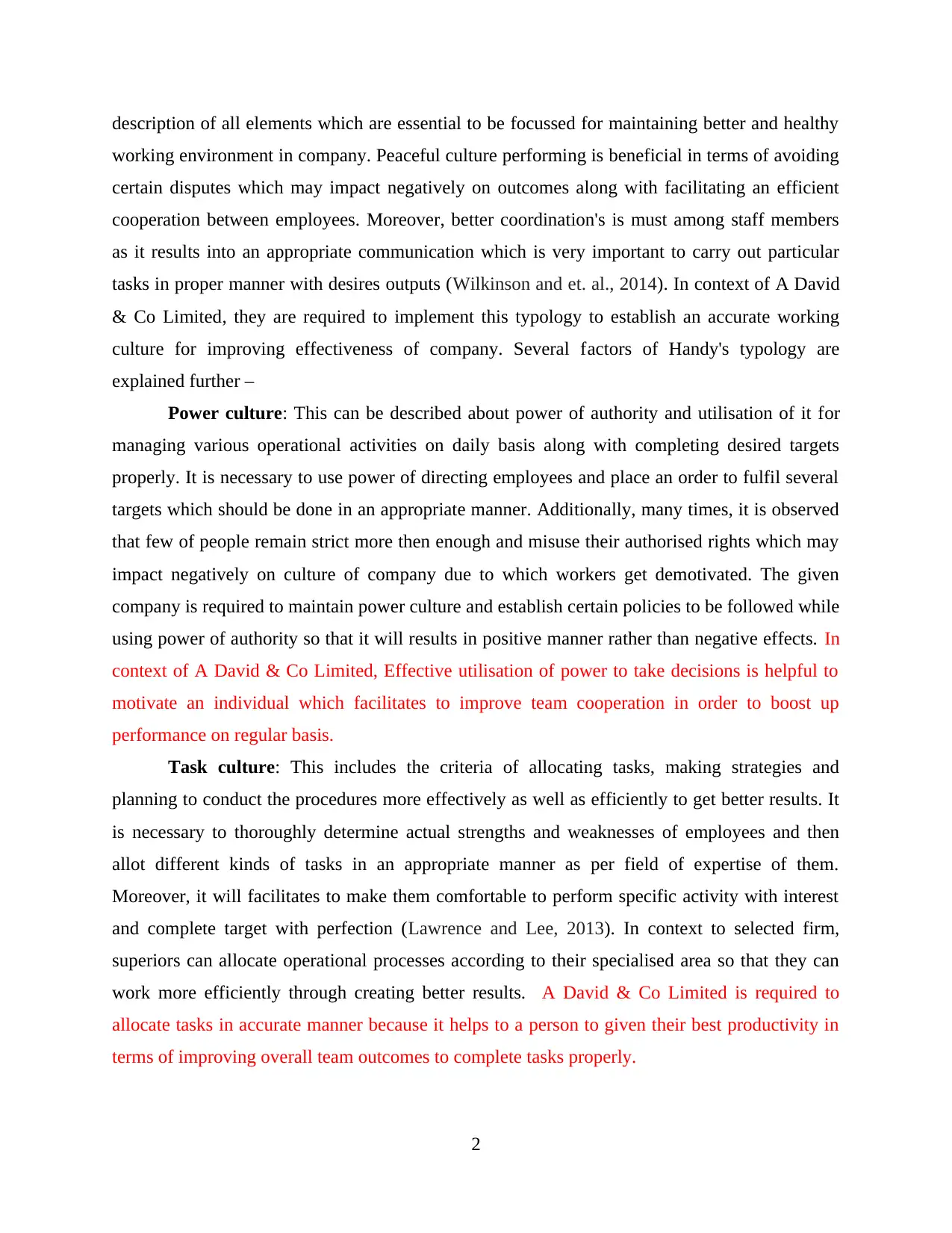
description of all elements which are essential to be focussed for maintaining better and healthy
working environment in company. Peaceful culture performing is beneficial in terms of avoiding
certain disputes which may impact negatively on outcomes along with facilitating an efficient
cooperation between employees. Moreover, better coordination's is must among staff members
as it results into an appropriate communication which is very important to carry out particular
tasks in proper manner with desires outputs (Wilkinson and et. al., 2014). In context of A David
& Co Limited, they are required to implement this typology to establish an accurate working
culture for improving effectiveness of company. Several factors of Handy's typology are
explained further –
Power culture: This can be described about power of authority and utilisation of it for
managing various operational activities on daily basis along with completing desired targets
properly. It is necessary to use power of directing employees and place an order to fulfil several
targets which should be done in an appropriate manner. Additionally, many times, it is observed
that few of people remain strict more then enough and misuse their authorised rights which may
impact negatively on culture of company due to which workers get demotivated. The given
company is required to maintain power culture and establish certain policies to be followed while
using power of authority so that it will results in positive manner rather than negative effects. In
context of A David & Co Limited, Effective utilisation of power to take decisions is helpful to
motivate an individual which facilitates to improve team cooperation in order to boost up
performance on regular basis.
Task culture: This includes the criteria of allocating tasks, making strategies and
planning to conduct the procedures more effectively as well as efficiently to get better results. It
is necessary to thoroughly determine actual strengths and weaknesses of employees and then
allot different kinds of tasks in an appropriate manner as per field of expertise of them.
Moreover, it will facilitates to make them comfortable to perform specific activity with interest
and complete target with perfection (Lawrence and Lee, 2013). In context to selected firm,
superiors can allocate operational processes according to their specialised area so that they can
work more efficiently through creating better results. A David & Co Limited is required to
allocate tasks in accurate manner because it helps to a person to given their best productivity in
terms of improving overall team outcomes to complete tasks properly.
2
working environment in company. Peaceful culture performing is beneficial in terms of avoiding
certain disputes which may impact negatively on outcomes along with facilitating an efficient
cooperation between employees. Moreover, better coordination's is must among staff members
as it results into an appropriate communication which is very important to carry out particular
tasks in proper manner with desires outputs (Wilkinson and et. al., 2014). In context of A David
& Co Limited, they are required to implement this typology to establish an accurate working
culture for improving effectiveness of company. Several factors of Handy's typology are
explained further –
Power culture: This can be described about power of authority and utilisation of it for
managing various operational activities on daily basis along with completing desired targets
properly. It is necessary to use power of directing employees and place an order to fulfil several
targets which should be done in an appropriate manner. Additionally, many times, it is observed
that few of people remain strict more then enough and misuse their authorised rights which may
impact negatively on culture of company due to which workers get demotivated. The given
company is required to maintain power culture and establish certain policies to be followed while
using power of authority so that it will results in positive manner rather than negative effects. In
context of A David & Co Limited, Effective utilisation of power to take decisions is helpful to
motivate an individual which facilitates to improve team cooperation in order to boost up
performance on regular basis.
Task culture: This includes the criteria of allocating tasks, making strategies and
planning to conduct the procedures more effectively as well as efficiently to get better results. It
is necessary to thoroughly determine actual strengths and weaknesses of employees and then
allot different kinds of tasks in an appropriate manner as per field of expertise of them.
Moreover, it will facilitates to make them comfortable to perform specific activity with interest
and complete target with perfection (Lawrence and Lee, 2013). In context to selected firm,
superiors can allocate operational processes according to their specialised area so that they can
work more efficiently through creating better results. A David & Co Limited is required to
allocate tasks in accurate manner because it helps to a person to given their best productivity in
terms of improving overall team outcomes to complete tasks properly.
2
Paraphrase This Document
Need a fresh take? Get an instant paraphrase of this document with our AI Paraphraser
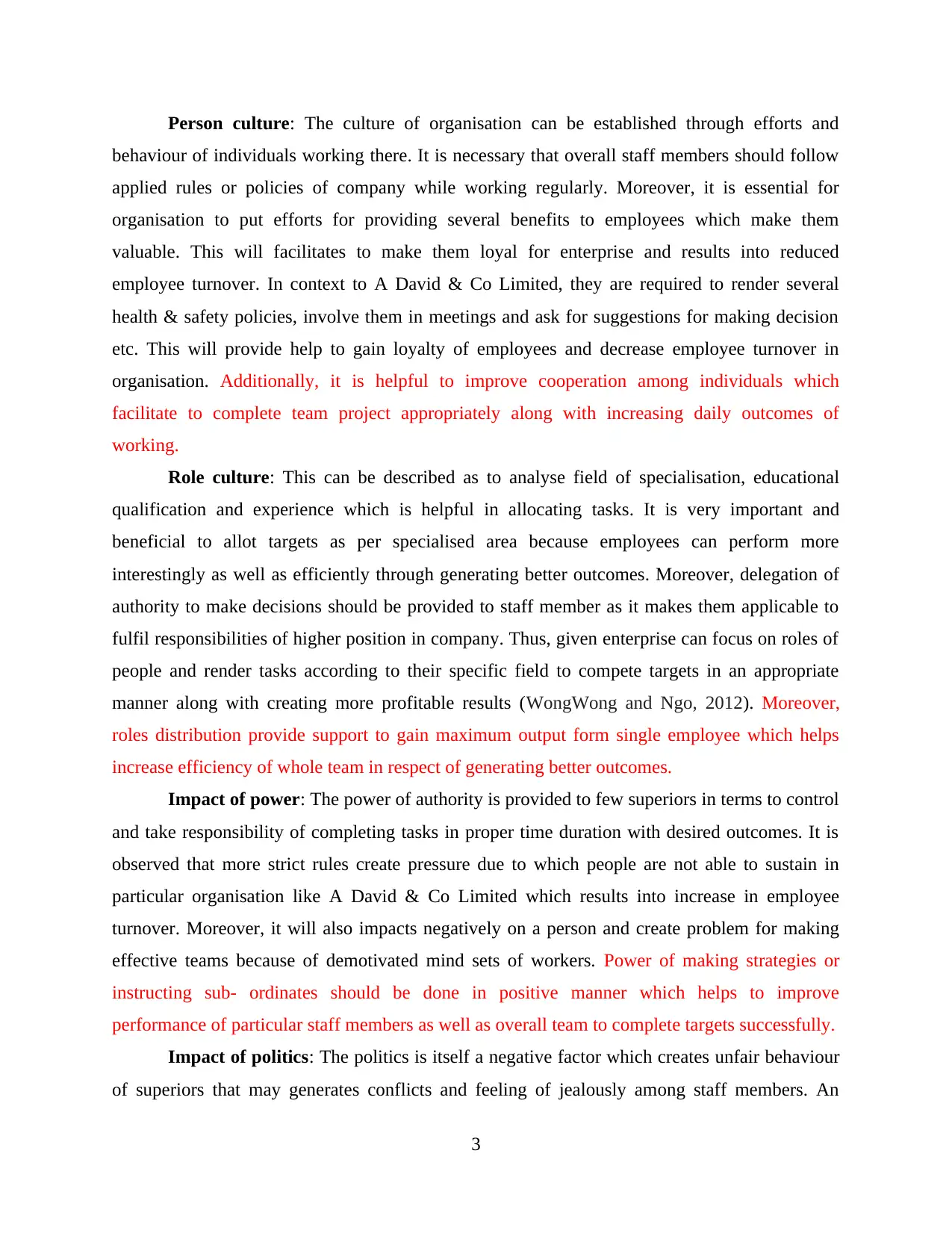
Person culture: The culture of organisation can be established through efforts and
behaviour of individuals working there. It is necessary that overall staff members should follow
applied rules or policies of company while working regularly. Moreover, it is essential for
organisation to put efforts for providing several benefits to employees which make them
valuable. This will facilitates to make them loyal for enterprise and results into reduced
employee turnover. In context to A David & Co Limited, they are required to render several
health & safety policies, involve them in meetings and ask for suggestions for making decision
etc. This will provide help to gain loyalty of employees and decrease employee turnover in
organisation. Additionally, it is helpful to improve cooperation among individuals which
facilitate to complete team project appropriately along with increasing daily outcomes of
working.
Role culture: This can be described as to analyse field of specialisation, educational
qualification and experience which is helpful in allocating tasks. It is very important and
beneficial to allot targets as per specialised area because employees can perform more
interestingly as well as efficiently through generating better outcomes. Moreover, delegation of
authority to make decisions should be provided to staff member as it makes them applicable to
fulfil responsibilities of higher position in company. Thus, given enterprise can focus on roles of
people and render tasks according to their specific field to compete targets in an appropriate
manner along with creating more profitable results (WongWong and Ngo, 2012). Moreover,
roles distribution provide support to gain maximum output form single employee which helps
increase efficiency of whole team in respect of generating better outcomes.
Impact of power: The power of authority is provided to few superiors in terms to control
and take responsibility of completing tasks in proper time duration with desired outcomes. It is
observed that more strict rules create pressure due to which people are not able to sustain in
particular organisation like A David & Co Limited which results into increase in employee
turnover. Moreover, it will also impacts negatively on a person and create problem for making
effective teams because of demotivated mind sets of workers. Power of making strategies or
instructing sub- ordinates should be done in positive manner which helps to improve
performance of particular staff members as well as overall team to complete targets successfully.
Impact of politics: The politics is itself a negative factor which creates unfair behaviour
of superiors that may generates conflicts and feeling of jealously among staff members. An
3
behaviour of individuals working there. It is necessary that overall staff members should follow
applied rules or policies of company while working regularly. Moreover, it is essential for
organisation to put efforts for providing several benefits to employees which make them
valuable. This will facilitates to make them loyal for enterprise and results into reduced
employee turnover. In context to A David & Co Limited, they are required to render several
health & safety policies, involve them in meetings and ask for suggestions for making decision
etc. This will provide help to gain loyalty of employees and decrease employee turnover in
organisation. Additionally, it is helpful to improve cooperation among individuals which
facilitate to complete team project appropriately along with increasing daily outcomes of
working.
Role culture: This can be described as to analyse field of specialisation, educational
qualification and experience which is helpful in allocating tasks. It is very important and
beneficial to allot targets as per specialised area because employees can perform more
interestingly as well as efficiently through generating better outcomes. Moreover, delegation of
authority to make decisions should be provided to staff member as it makes them applicable to
fulfil responsibilities of higher position in company. Thus, given enterprise can focus on roles of
people and render tasks according to their specific field to compete targets in an appropriate
manner along with creating more profitable results (WongWong and Ngo, 2012). Moreover,
roles distribution provide support to gain maximum output form single employee which helps
increase efficiency of whole team in respect of generating better outcomes.
Impact of power: The power of authority is provided to few superiors in terms to control
and take responsibility of completing tasks in proper time duration with desired outcomes. It is
observed that more strict rules create pressure due to which people are not able to sustain in
particular organisation like A David & Co Limited which results into increase in employee
turnover. Moreover, it will also impacts negatively on a person and create problem for making
effective teams because of demotivated mind sets of workers. Power of making strategies or
instructing sub- ordinates should be done in positive manner which helps to improve
performance of particular staff members as well as overall team to complete targets successfully.
Impact of politics: The politics is itself a negative factor which creates unfair behaviour
of superiors that may generates conflicts and feeling of jealously among staff members. An
3
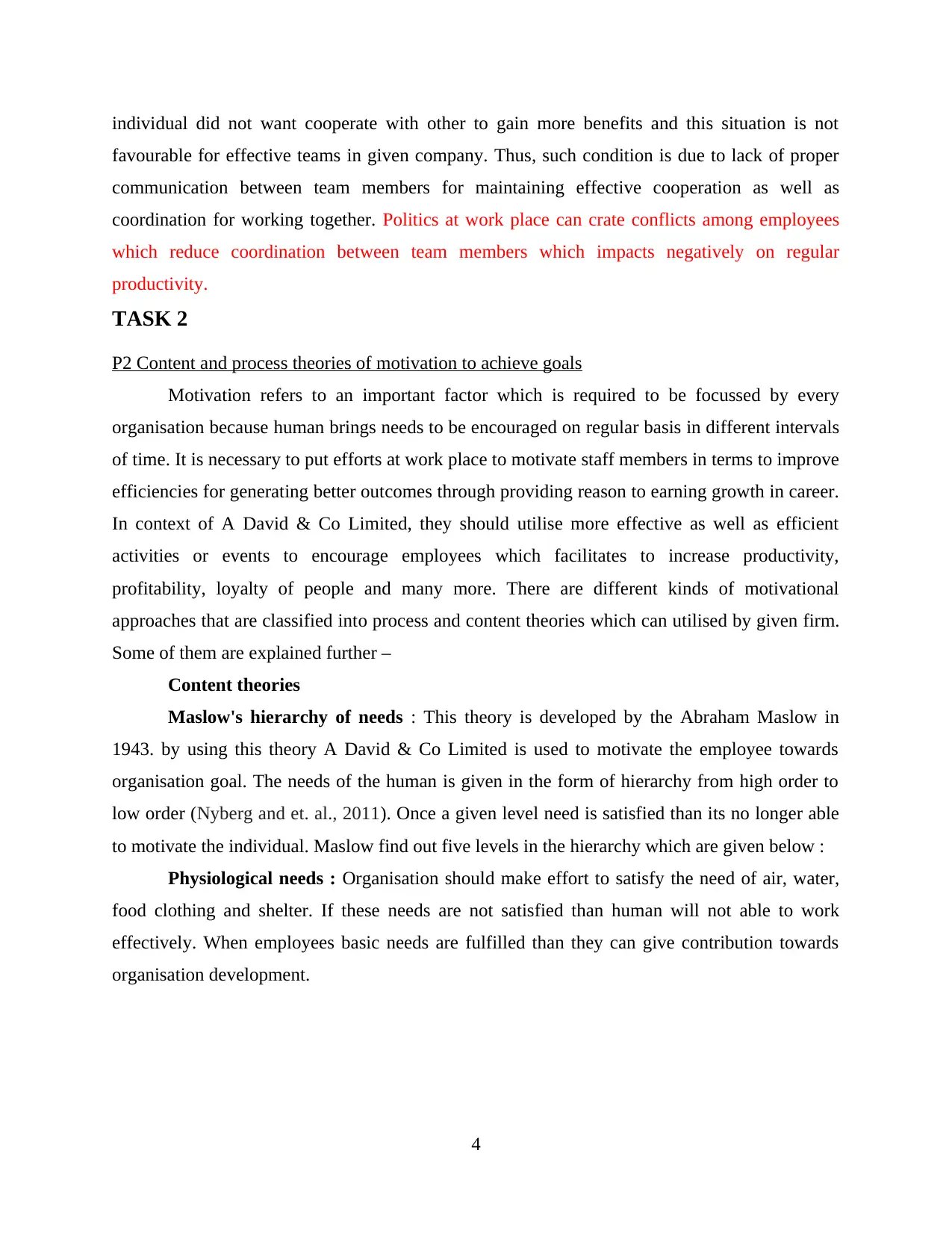
individual did not want cooperate with other to gain more benefits and this situation is not
favourable for effective teams in given company. Thus, such condition is due to lack of proper
communication between team members for maintaining effective cooperation as well as
coordination for working together. Politics at work place can crate conflicts among employees
which reduce coordination between team members which impacts negatively on regular
productivity.
TASK 2
P2 Content and process theories of motivation to achieve goals
Motivation refers to an important factor which is required to be focussed by every
organisation because human brings needs to be encouraged on regular basis in different intervals
of time. It is necessary to put efforts at work place to motivate staff members in terms to improve
efficiencies for generating better outcomes through providing reason to earning growth in career.
In context of A David & Co Limited, they should utilise more effective as well as efficient
activities or events to encourage employees which facilitates to increase productivity,
profitability, loyalty of people and many more. There are different kinds of motivational
approaches that are classified into process and content theories which can utilised by given firm.
Some of them are explained further –
Content theories
Maslow's hierarchy of needs : This theory is developed by the Abraham Maslow in
1943. by using this theory A David & Co Limited is used to motivate the employee towards
organisation goal. The needs of the human is given in the form of hierarchy from high order to
low order (Nyberg and et. al., 2011). Once a given level need is satisfied than its no longer able
to motivate the individual. Maslow find out five levels in the hierarchy which are given below :
Physiological needs : Organisation should make effort to satisfy the need of air, water,
food clothing and shelter. If these needs are not satisfied than human will not able to work
effectively. When employees basic needs are fulfilled than they can give contribution towards
organisation development.
4
favourable for effective teams in given company. Thus, such condition is due to lack of proper
communication between team members for maintaining effective cooperation as well as
coordination for working together. Politics at work place can crate conflicts among employees
which reduce coordination between team members which impacts negatively on regular
productivity.
TASK 2
P2 Content and process theories of motivation to achieve goals
Motivation refers to an important factor which is required to be focussed by every
organisation because human brings needs to be encouraged on regular basis in different intervals
of time. It is necessary to put efforts at work place to motivate staff members in terms to improve
efficiencies for generating better outcomes through providing reason to earning growth in career.
In context of A David & Co Limited, they should utilise more effective as well as efficient
activities or events to encourage employees which facilitates to increase productivity,
profitability, loyalty of people and many more. There are different kinds of motivational
approaches that are classified into process and content theories which can utilised by given firm.
Some of them are explained further –
Content theories
Maslow's hierarchy of needs : This theory is developed by the Abraham Maslow in
1943. by using this theory A David & Co Limited is used to motivate the employee towards
organisation goal. The needs of the human is given in the form of hierarchy from high order to
low order (Nyberg and et. al., 2011). Once a given level need is satisfied than its no longer able
to motivate the individual. Maslow find out five levels in the hierarchy which are given below :
Physiological needs : Organisation should make effort to satisfy the need of air, water,
food clothing and shelter. If these needs are not satisfied than human will not able to work
effectively. When employees basic needs are fulfilled than they can give contribution towards
organisation development.
4
⊘ This is a preview!⊘
Do you want full access?
Subscribe today to unlock all pages.

Trusted by 1+ million students worldwide
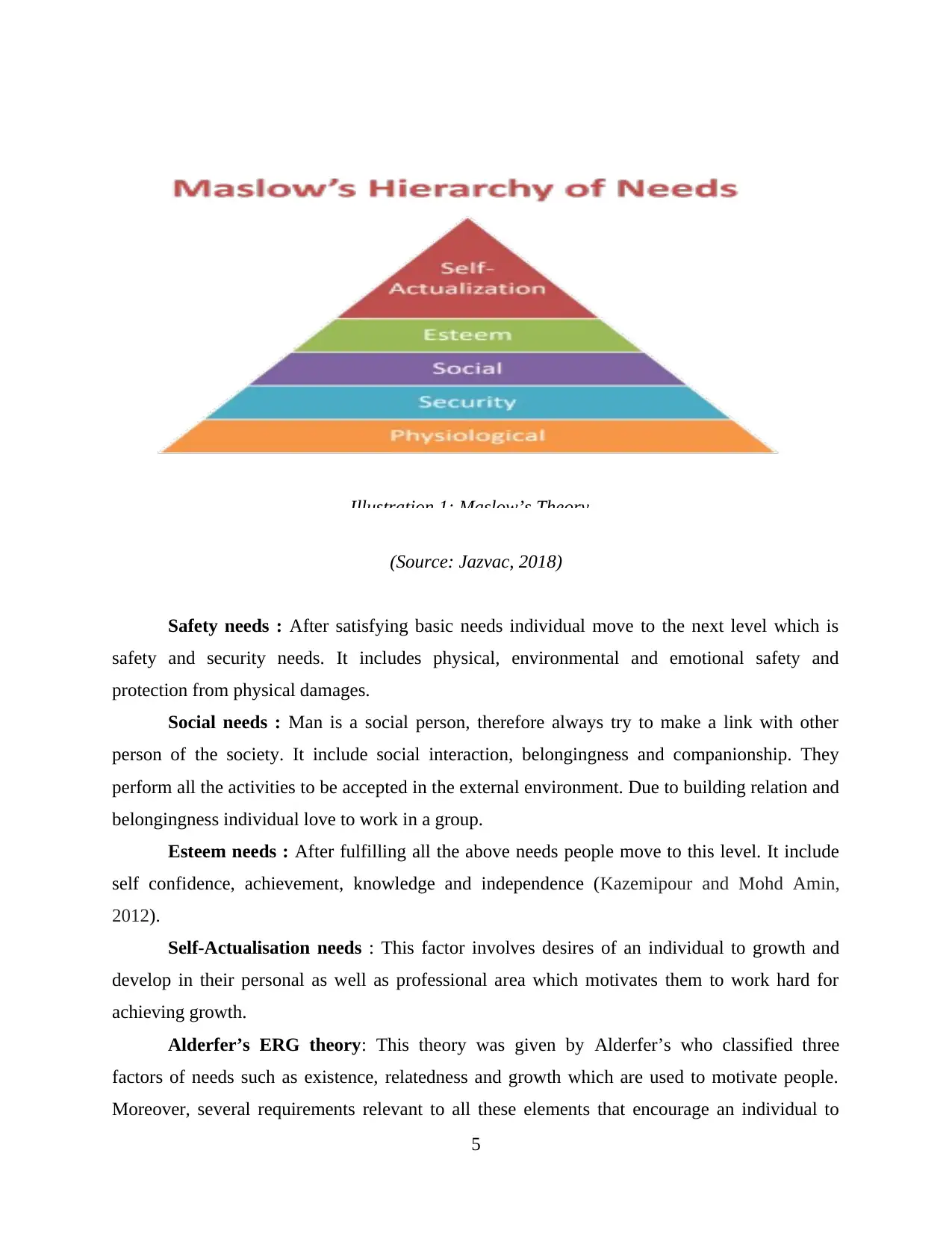
(Source: Jazvac, 2018)
Safety needs : After satisfying basic needs individual move to the next level which is
safety and security needs. It includes physical, environmental and emotional safety and
protection from physical damages.
Social needs : Man is a social person, therefore always try to make a link with other
person of the society. It include social interaction, belongingness and companionship. They
perform all the activities to be accepted in the external environment. Due to building relation and
belongingness individual love to work in a group.
Esteem needs : After fulfilling all the above needs people move to this level. It include
self confidence, achievement, knowledge and independence (Kazemipour and Mohd Amin,
2012).
Self-Actualisation needs : This factor involves desires of an individual to growth and
develop in their personal as well as professional area which motivates them to work hard for
achieving growth.
Alderfer’s ERG theory: This theory was given by Alderfer’s who classified three
factors of needs such as existence, relatedness and growth which are used to motivate people.
Moreover, several requirements relevant to all these elements that encourage an individual to
5
Illustration 1: Maslow’s Theory
Safety needs : After satisfying basic needs individual move to the next level which is
safety and security needs. It includes physical, environmental and emotional safety and
protection from physical damages.
Social needs : Man is a social person, therefore always try to make a link with other
person of the society. It include social interaction, belongingness and companionship. They
perform all the activities to be accepted in the external environment. Due to building relation and
belongingness individual love to work in a group.
Esteem needs : After fulfilling all the above needs people move to this level. It include
self confidence, achievement, knowledge and independence (Kazemipour and Mohd Amin,
2012).
Self-Actualisation needs : This factor involves desires of an individual to growth and
develop in their personal as well as professional area which motivates them to work hard for
achieving growth.
Alderfer’s ERG theory: This theory was given by Alderfer’s who classified three
factors of needs such as existence, relatedness and growth which are used to motivate people.
Moreover, several requirements relevant to all these elements that encourage an individual to
5
Illustration 1: Maslow’s Theory
Paraphrase This Document
Need a fresh take? Get an instant paraphrase of this document with our AI Paraphraser
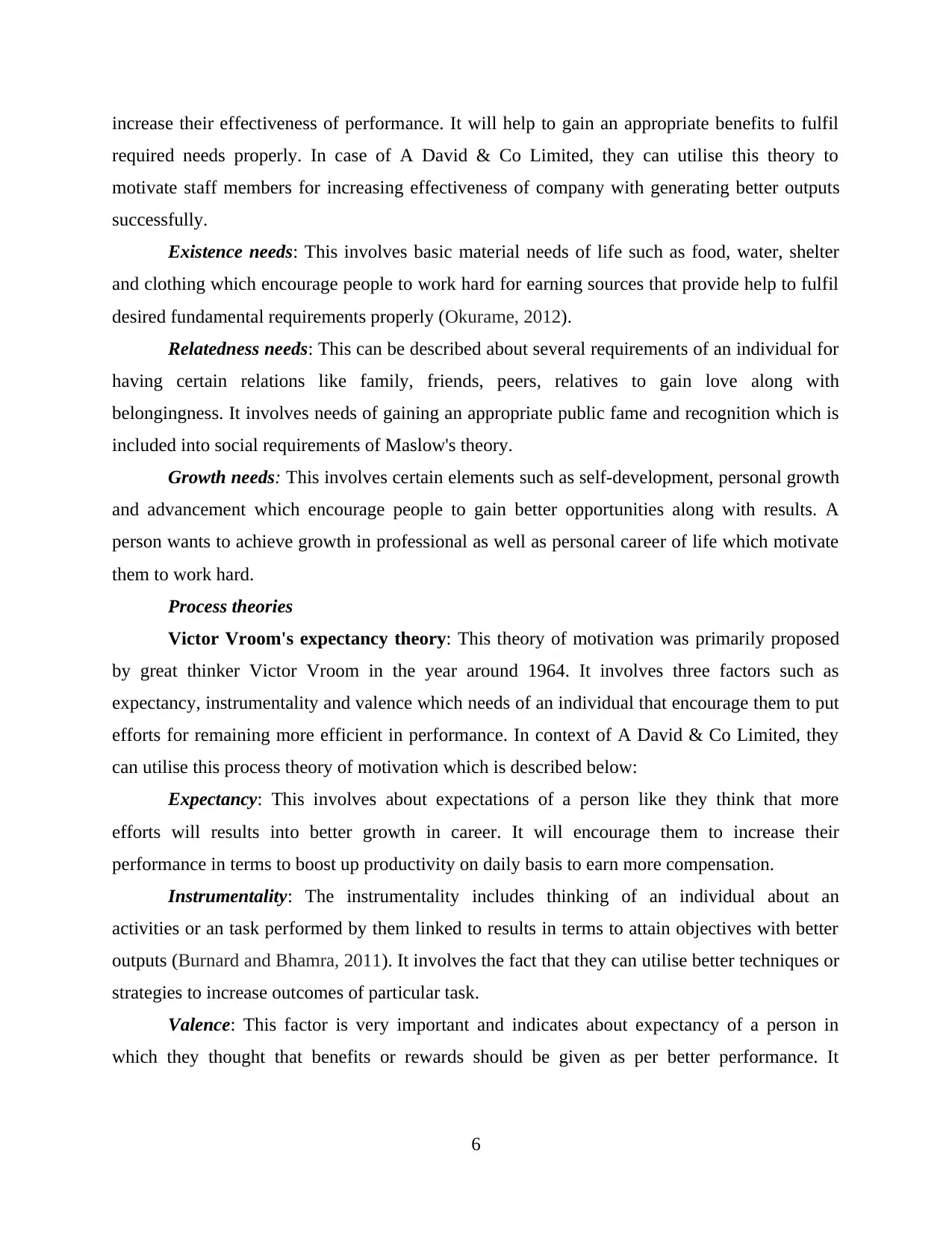
increase their effectiveness of performance. It will help to gain an appropriate benefits to fulfil
required needs properly. In case of A David & Co Limited, they can utilise this theory to
motivate staff members for increasing effectiveness of company with generating better outputs
successfully.
Existence needs: This involves basic material needs of life such as food, water, shelter
and clothing which encourage people to work hard for earning sources that provide help to fulfil
desired fundamental requirements properly (Okurame, 2012).
Relatedness needs: This can be described about several requirements of an individual for
having certain relations like family, friends, peers, relatives to gain love along with
belongingness. It involves needs of gaining an appropriate public fame and recognition which is
included into social requirements of Maslow's theory.
Growth needs: This involves certain elements such as self-development, personal growth
and advancement which encourage people to gain better opportunities along with results. A
person wants to achieve growth in professional as well as personal career of life which motivate
them to work hard.
Process theories
Victor Vroom's expectancy theory: This theory of motivation was primarily proposed
by great thinker Victor Vroom in the year around 1964. It involves three factors such as
expectancy, instrumentality and valence which needs of an individual that encourage them to put
efforts for remaining more efficient in performance. In context of A David & Co Limited, they
can utilise this process theory of motivation which is described below:
Expectancy: This involves about expectations of a person like they think that more
efforts will results into better growth in career. It will encourage them to increase their
performance in terms to boost up productivity on daily basis to earn more compensation.
Instrumentality: The instrumentality includes thinking of an individual about an
activities or an task performed by them linked to results in terms to attain objectives with better
outputs (Burnard and Bhamra, 2011). It involves the fact that they can utilise better techniques or
strategies to increase outcomes of particular task.
Valence: This factor is very important and indicates about expectancy of a person in
which they thought that benefits or rewards should be given as per better performance. It
6
required needs properly. In case of A David & Co Limited, they can utilise this theory to
motivate staff members for increasing effectiveness of company with generating better outputs
successfully.
Existence needs: This involves basic material needs of life such as food, water, shelter
and clothing which encourage people to work hard for earning sources that provide help to fulfil
desired fundamental requirements properly (Okurame, 2012).
Relatedness needs: This can be described about several requirements of an individual for
having certain relations like family, friends, peers, relatives to gain love along with
belongingness. It involves needs of gaining an appropriate public fame and recognition which is
included into social requirements of Maslow's theory.
Growth needs: This involves certain elements such as self-development, personal growth
and advancement which encourage people to gain better opportunities along with results. A
person wants to achieve growth in professional as well as personal career of life which motivate
them to work hard.
Process theories
Victor Vroom's expectancy theory: This theory of motivation was primarily proposed
by great thinker Victor Vroom in the year around 1964. It involves three factors such as
expectancy, instrumentality and valence which needs of an individual that encourage them to put
efforts for remaining more efficient in performance. In context of A David & Co Limited, they
can utilise this process theory of motivation which is described below:
Expectancy: This involves about expectations of a person like they think that more
efforts will results into better growth in career. It will encourage them to increase their
performance in terms to boost up productivity on daily basis to earn more compensation.
Instrumentality: The instrumentality includes thinking of an individual about an
activities or an task performed by them linked to results in terms to attain objectives with better
outputs (Burnard and Bhamra, 2011). It involves the fact that they can utilise better techniques or
strategies to increase outcomes of particular task.
Valence: This factor is very important and indicates about expectancy of a person in
which they thought that benefits or rewards should be given as per better performance. It
6
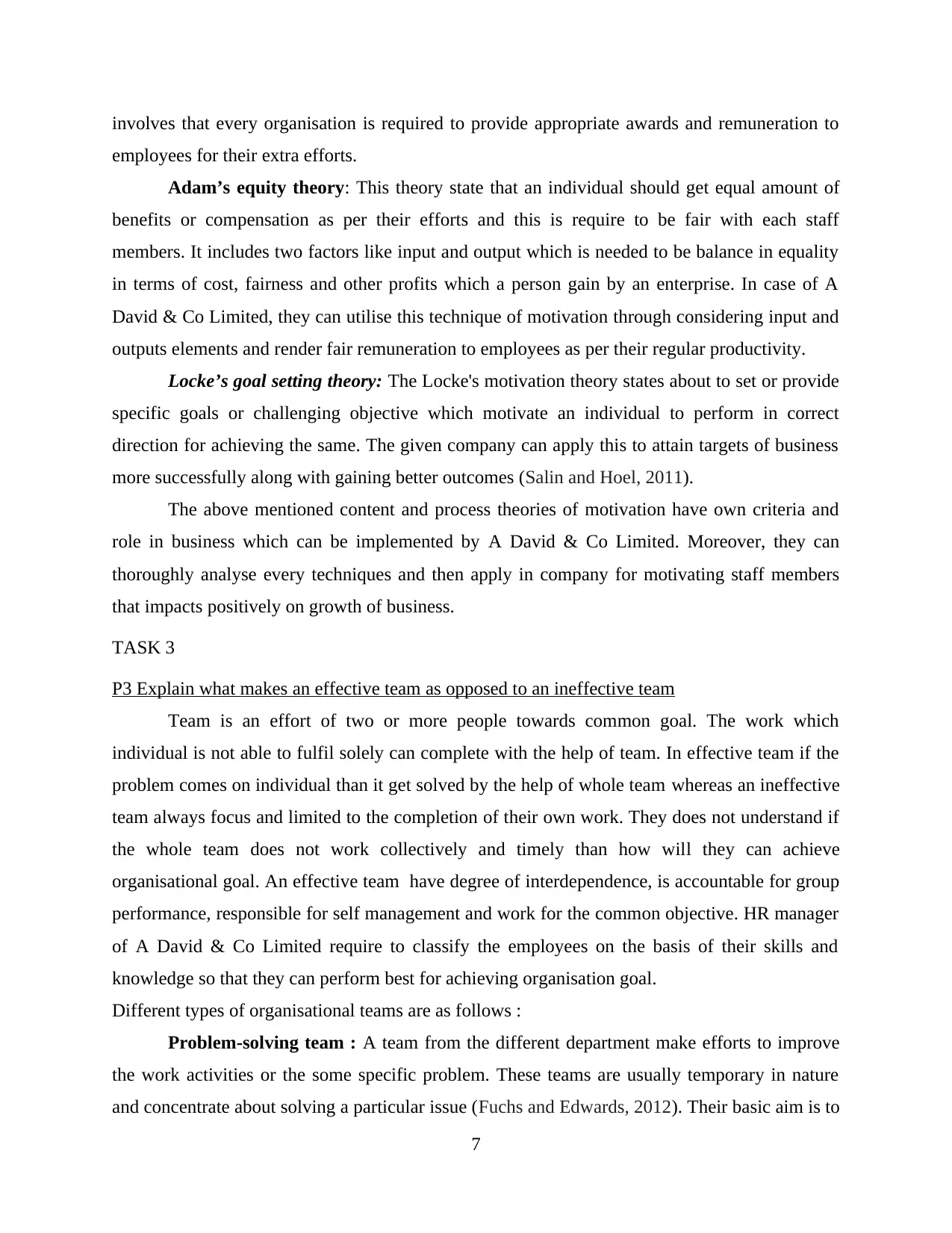
involves that every organisation is required to provide appropriate awards and remuneration to
employees for their extra efforts.
Adam’s equity theory: This theory state that an individual should get equal amount of
benefits or compensation as per their efforts and this is require to be fair with each staff
members. It includes two factors like input and output which is needed to be balance in equality
in terms of cost, fairness and other profits which a person gain by an enterprise. In case of A
David & Co Limited, they can utilise this technique of motivation through considering input and
outputs elements and render fair remuneration to employees as per their regular productivity.
Locke’s goal setting theory: The Locke's motivation theory states about to set or provide
specific goals or challenging objective which motivate an individual to perform in correct
direction for achieving the same. The given company can apply this to attain targets of business
more successfully along with gaining better outcomes (Salin and Hoel, 2011).
The above mentioned content and process theories of motivation have own criteria and
role in business which can be implemented by A David & Co Limited. Moreover, they can
thoroughly analyse every techniques and then apply in company for motivating staff members
that impacts positively on growth of business.
TASK 3
P3 Explain what makes an effective team as opposed to an ineffective team
Team is an effort of two or more people towards common goal. The work which
individual is not able to fulfil solely can complete with the help of team. In effective team if the
problem comes on individual than it get solved by the help of whole team whereas an ineffective
team always focus and limited to the completion of their own work. They does not understand if
the whole team does not work collectively and timely than how will they can achieve
organisational goal. An effective team have degree of interdependence, is accountable for group
performance, responsible for self management and work for the common objective. HR manager
of A David & Co Limited require to classify the employees on the basis of their skills and
knowledge so that they can perform best for achieving organisation goal.
Different types of organisational teams are as follows :
Problem-solving team : A team from the different department make efforts to improve
the work activities or the some specific problem. These teams are usually temporary in nature
and concentrate about solving a particular issue (Fuchs and Edwards, 2012). Their basic aim is to
7
employees for their extra efforts.
Adam’s equity theory: This theory state that an individual should get equal amount of
benefits or compensation as per their efforts and this is require to be fair with each staff
members. It includes two factors like input and output which is needed to be balance in equality
in terms of cost, fairness and other profits which a person gain by an enterprise. In case of A
David & Co Limited, they can utilise this technique of motivation through considering input and
outputs elements and render fair remuneration to employees as per their regular productivity.
Locke’s goal setting theory: The Locke's motivation theory states about to set or provide
specific goals or challenging objective which motivate an individual to perform in correct
direction for achieving the same. The given company can apply this to attain targets of business
more successfully along with gaining better outcomes (Salin and Hoel, 2011).
The above mentioned content and process theories of motivation have own criteria and
role in business which can be implemented by A David & Co Limited. Moreover, they can
thoroughly analyse every techniques and then apply in company for motivating staff members
that impacts positively on growth of business.
TASK 3
P3 Explain what makes an effective team as opposed to an ineffective team
Team is an effort of two or more people towards common goal. The work which
individual is not able to fulfil solely can complete with the help of team. In effective team if the
problem comes on individual than it get solved by the help of whole team whereas an ineffective
team always focus and limited to the completion of their own work. They does not understand if
the whole team does not work collectively and timely than how will they can achieve
organisational goal. An effective team have degree of interdependence, is accountable for group
performance, responsible for self management and work for the common objective. HR manager
of A David & Co Limited require to classify the employees on the basis of their skills and
knowledge so that they can perform best for achieving organisation goal.
Different types of organisational teams are as follows :
Problem-solving team : A team from the different department make efforts to improve
the work activities or the some specific problem. These teams are usually temporary in nature
and concentrate about solving a particular issue (Fuchs and Edwards, 2012). Their basic aim is to
7
⊘ This is a preview!⊘
Do you want full access?
Subscribe today to unlock all pages.

Trusted by 1+ million students worldwide
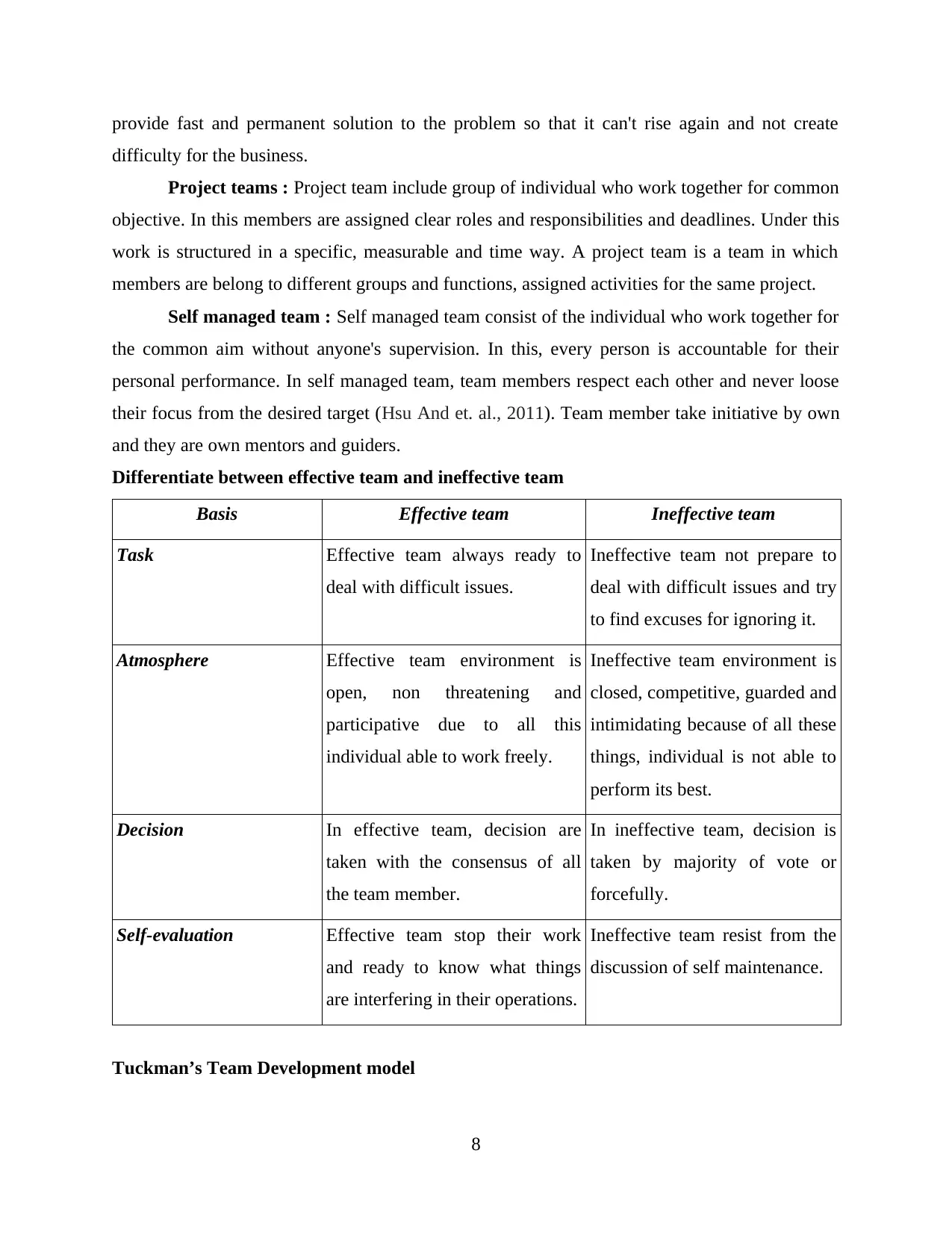
provide fast and permanent solution to the problem so that it can't rise again and not create
difficulty for the business.
Project teams : Project team include group of individual who work together for common
objective. In this members are assigned clear roles and responsibilities and deadlines. Under this
work is structured in a specific, measurable and time way. A project team is a team in which
members are belong to different groups and functions, assigned activities for the same project.
Self managed team : Self managed team consist of the individual who work together for
the common aim without anyone's supervision. In this, every person is accountable for their
personal performance. In self managed team, team members respect each other and never loose
their focus from the desired target (Hsu And et. al., 2011). Team member take initiative by own
and they are own mentors and guiders.
Differentiate between effective team and ineffective team
Basis Effective team Ineffective team
Task Effective team always ready to
deal with difficult issues.
Ineffective team not prepare to
deal with difficult issues and try
to find excuses for ignoring it.
Atmosphere Effective team environment is
open, non threatening and
participative due to all this
individual able to work freely.
Ineffective team environment is
closed, competitive, guarded and
intimidating because of all these
things, individual is not able to
perform its best.
Decision In effective team, decision are
taken with the consensus of all
the team member.
In ineffective team, decision is
taken by majority of vote or
forcefully.
Self-evaluation Effective team stop their work
and ready to know what things
are interfering in their operations.
Ineffective team resist from the
discussion of self maintenance.
Tuckman’s Team Development model
8
difficulty for the business.
Project teams : Project team include group of individual who work together for common
objective. In this members are assigned clear roles and responsibilities and deadlines. Under this
work is structured in a specific, measurable and time way. A project team is a team in which
members are belong to different groups and functions, assigned activities for the same project.
Self managed team : Self managed team consist of the individual who work together for
the common aim without anyone's supervision. In this, every person is accountable for their
personal performance. In self managed team, team members respect each other and never loose
their focus from the desired target (Hsu And et. al., 2011). Team member take initiative by own
and they are own mentors and guiders.
Differentiate between effective team and ineffective team
Basis Effective team Ineffective team
Task Effective team always ready to
deal with difficult issues.
Ineffective team not prepare to
deal with difficult issues and try
to find excuses for ignoring it.
Atmosphere Effective team environment is
open, non threatening and
participative due to all this
individual able to work freely.
Ineffective team environment is
closed, competitive, guarded and
intimidating because of all these
things, individual is not able to
perform its best.
Decision In effective team, decision are
taken with the consensus of all
the team member.
In ineffective team, decision is
taken by majority of vote or
forcefully.
Self-evaluation Effective team stop their work
and ready to know what things
are interfering in their operations.
Ineffective team resist from the
discussion of self maintenance.
Tuckman’s Team Development model
8
Paraphrase This Document
Need a fresh take? Get an instant paraphrase of this document with our AI Paraphraser
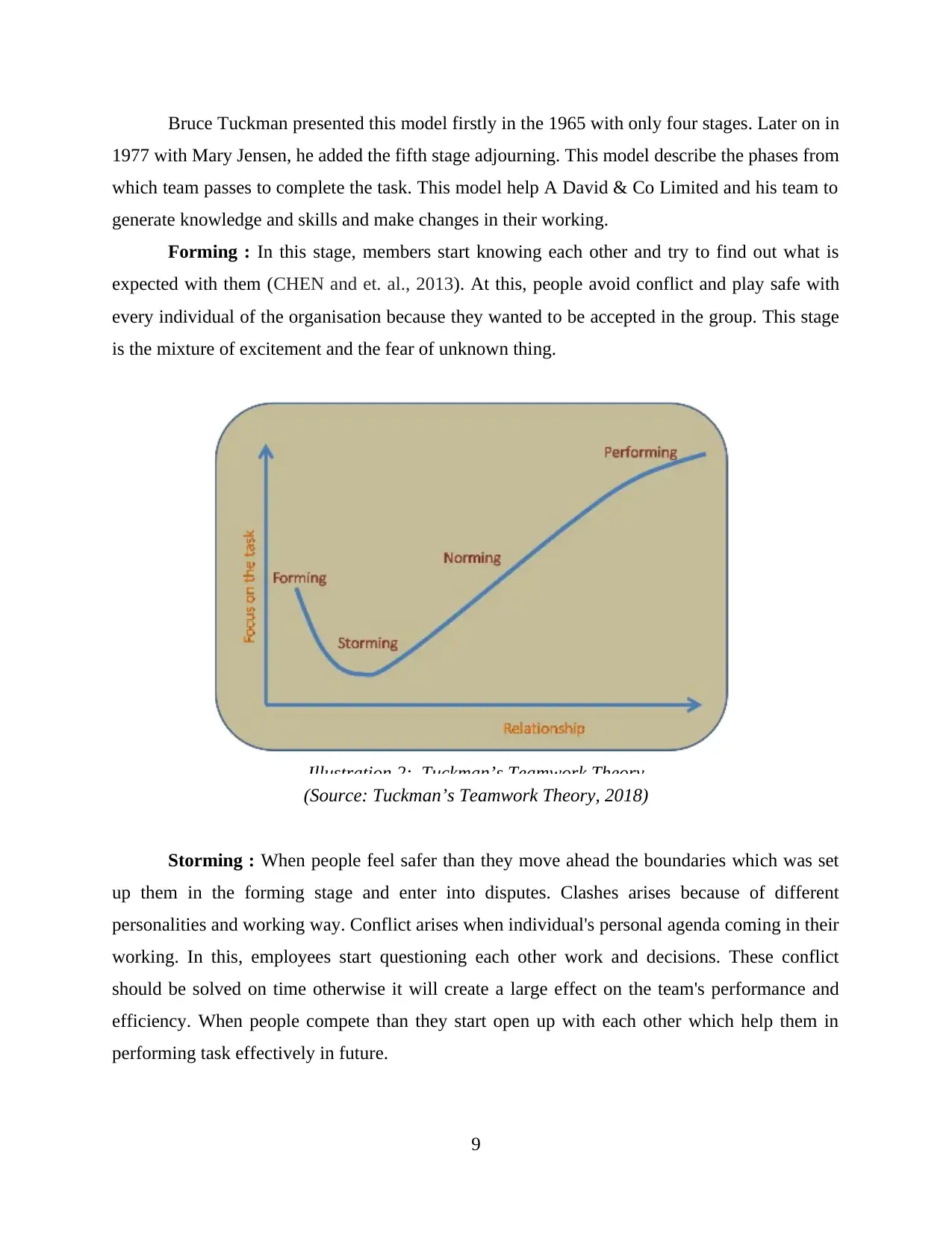
Bruce Tuckman presented this model firstly in the 1965 with only four stages. Later on in
1977 with Mary Jensen, he added the fifth stage adjourning. This model describe the phases from
which team passes to complete the task. This model help A David & Co Limited and his team to
generate knowledge and skills and make changes in their working.
Forming : In this stage, members start knowing each other and try to find out what is
expected with them (CHEN and et. al., 2013). At this, people avoid conflict and play safe with
every individual of the organisation because they wanted to be accepted in the group. This stage
is the mixture of excitement and the fear of unknown thing.
(Source: Tuckman’s Teamwork Theory, 2018)
Storming : When people feel safer than they move ahead the boundaries which was set
up them in the forming stage and enter into disputes. Clashes arises because of different
personalities and working way. Conflict arises when individual's personal agenda coming in their
working. In this, employees start questioning each other work and decisions. These conflict
should be solved on time otherwise it will create a large effect on the team's performance and
efficiency. When people compete than they start open up with each other which help them in
performing task effectively in future.
9
Illustration 2: Tuckman’s Teamwork Theory
1977 with Mary Jensen, he added the fifth stage adjourning. This model describe the phases from
which team passes to complete the task. This model help A David & Co Limited and his team to
generate knowledge and skills and make changes in their working.
Forming : In this stage, members start knowing each other and try to find out what is
expected with them (CHEN and et. al., 2013). At this, people avoid conflict and play safe with
every individual of the organisation because they wanted to be accepted in the group. This stage
is the mixture of excitement and the fear of unknown thing.
(Source: Tuckman’s Teamwork Theory, 2018)
Storming : When people feel safer than they move ahead the boundaries which was set
up them in the forming stage and enter into disputes. Clashes arises because of different
personalities and working way. Conflict arises when individual's personal agenda coming in their
working. In this, employees start questioning each other work and decisions. These conflict
should be solved on time otherwise it will create a large effect on the team's performance and
efficiency. When people compete than they start open up with each other which help them in
performing task effectively in future.
9
Illustration 2: Tuckman’s Teamwork Theory
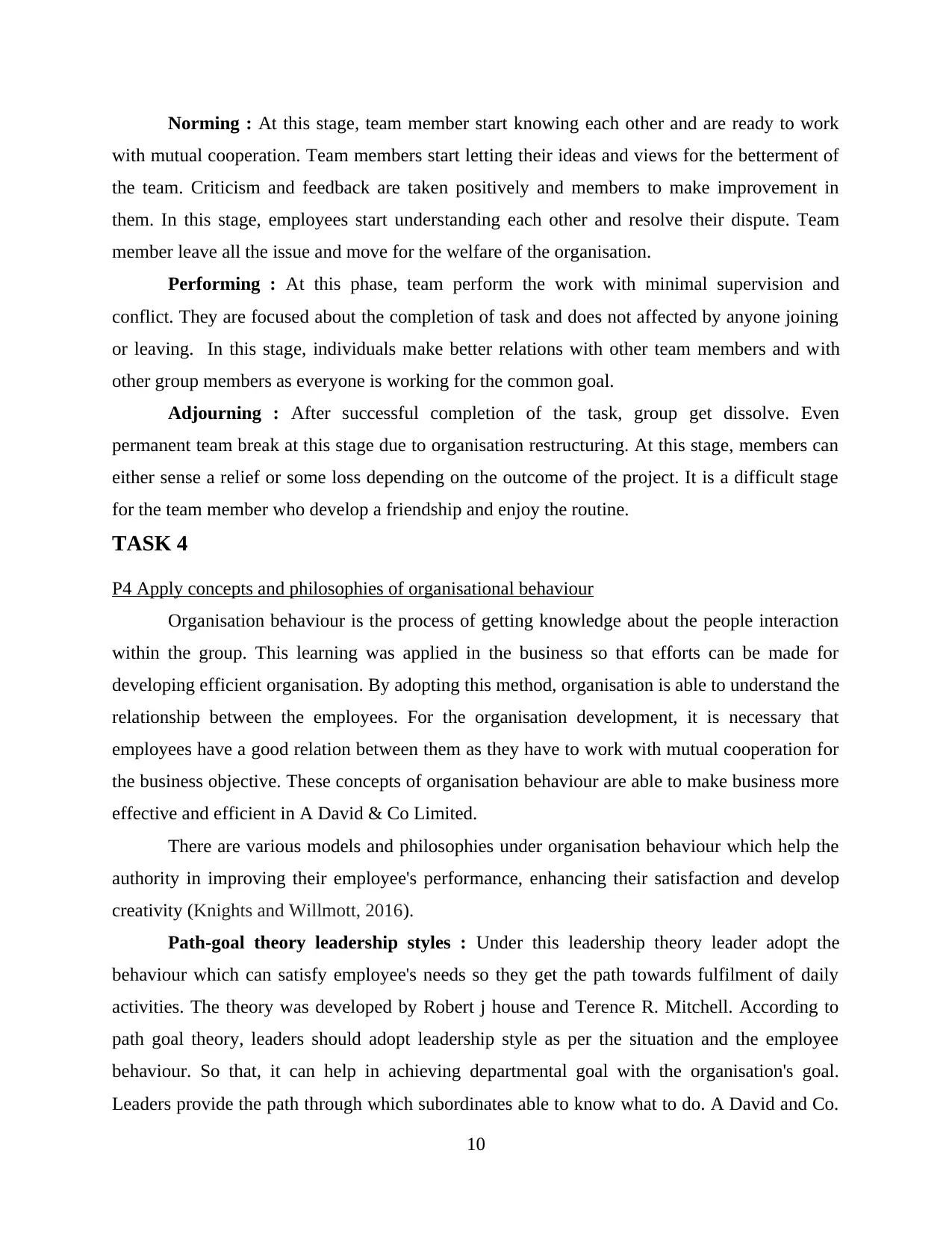
Norming : At this stage, team member start knowing each other and are ready to work
with mutual cooperation. Team members start letting their ideas and views for the betterment of
the team. Criticism and feedback are taken positively and members to make improvement in
them. In this stage, employees start understanding each other and resolve their dispute. Team
member leave all the issue and move for the welfare of the organisation.
Performing : At this phase, team perform the work with minimal supervision and
conflict. They are focused about the completion of task and does not affected by anyone joining
or leaving. In this stage, individuals make better relations with other team members and with
other group members as everyone is working for the common goal.
Adjourning : After successful completion of the task, group get dissolve. Even
permanent team break at this stage due to organisation restructuring. At this stage, members can
either sense a relief or some loss depending on the outcome of the project. It is a difficult stage
for the team member who develop a friendship and enjoy the routine.
TASK 4
P4 Apply concepts and philosophies of organisational behaviour
Organisation behaviour is the process of getting knowledge about the people interaction
within the group. This learning was applied in the business so that efforts can be made for
developing efficient organisation. By adopting this method, organisation is able to understand the
relationship between the employees. For the organisation development, it is necessary that
employees have a good relation between them as they have to work with mutual cooperation for
the business objective. These concepts of organisation behaviour are able to make business more
effective and efficient in A David & Co Limited.
There are various models and philosophies under organisation behaviour which help the
authority in improving their employee's performance, enhancing their satisfaction and develop
creativity (Knights and Willmott, 2016).
Path-goal theory leadership styles : Under this leadership theory leader adopt the
behaviour which can satisfy employee's needs so they get the path towards fulfilment of daily
activities. The theory was developed by Robert j house and Terence R. Mitchell. According to
path goal theory, leaders should adopt leadership style as per the situation and the employee
behaviour. So that, it can help in achieving departmental goal with the organisation's goal.
Leaders provide the path through which subordinates able to know what to do. A David and Co.
10
with mutual cooperation. Team members start letting their ideas and views for the betterment of
the team. Criticism and feedback are taken positively and members to make improvement in
them. In this stage, employees start understanding each other and resolve their dispute. Team
member leave all the issue and move for the welfare of the organisation.
Performing : At this phase, team perform the work with minimal supervision and
conflict. They are focused about the completion of task and does not affected by anyone joining
or leaving. In this stage, individuals make better relations with other team members and with
other group members as everyone is working for the common goal.
Adjourning : After successful completion of the task, group get dissolve. Even
permanent team break at this stage due to organisation restructuring. At this stage, members can
either sense a relief or some loss depending on the outcome of the project. It is a difficult stage
for the team member who develop a friendship and enjoy the routine.
TASK 4
P4 Apply concepts and philosophies of organisational behaviour
Organisation behaviour is the process of getting knowledge about the people interaction
within the group. This learning was applied in the business so that efforts can be made for
developing efficient organisation. By adopting this method, organisation is able to understand the
relationship between the employees. For the organisation development, it is necessary that
employees have a good relation between them as they have to work with mutual cooperation for
the business objective. These concepts of organisation behaviour are able to make business more
effective and efficient in A David & Co Limited.
There are various models and philosophies under organisation behaviour which help the
authority in improving their employee's performance, enhancing their satisfaction and develop
creativity (Knights and Willmott, 2016).
Path-goal theory leadership styles : Under this leadership theory leader adopt the
behaviour which can satisfy employee's needs so they get the path towards fulfilment of daily
activities. The theory was developed by Robert j house and Terence R. Mitchell. According to
path goal theory, leaders should adopt leadership style as per the situation and the employee
behaviour. So that, it can help in achieving departmental goal with the organisation's goal.
Leaders provide the path through which subordinates able to know what to do. A David and Co.
10
⊘ This is a preview!⊘
Do you want full access?
Subscribe today to unlock all pages.

Trusted by 1+ million students worldwide
1 out of 16
Related Documents
Your All-in-One AI-Powered Toolkit for Academic Success.
+13062052269
info@desklib.com
Available 24*7 on WhatsApp / Email
![[object Object]](/_next/static/media/star-bottom.7253800d.svg)
Unlock your academic potential
Copyright © 2020–2026 A2Z Services. All Rights Reserved. Developed and managed by ZUCOL.





